10 Reasons to Grow a Vegetable Garden
This post may contain affiliate links, which means that I may receive a commission if you make a purchase using these links. As an Amazon Associate I earn from qualifying purchases.
Growing a vegetable garden for fresh organic food is more important than ever. Consider these 10 reasons to grow organic food, plus tips to get started vegetable gardening in your backyard, on your patio, and even indoors.
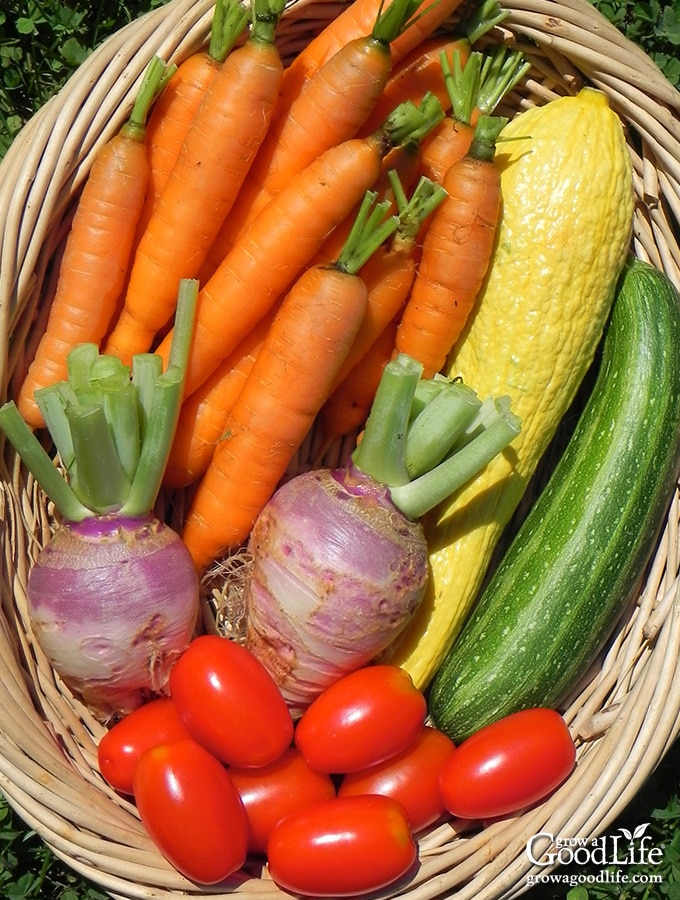
Do you ever wonder whether growing your own food is worth the time and effort? Here are some benefits to growing your own organic food for you, your family, and the environment.
There was a time when I didn’t give much thought about the foods we buy in the grocery stores. That changed when food recalls became more frequently reported in the news. One food recall in particular caught my attention because the local news reported E. coli contamination of spinach that was sold at my grocery store. It was the fall of 2006, and this recall eventually affected 26 states stretching from Wyoming to Maine.
The first question that came to mind was, “Why was my grocery store selling spinach from California when it grows quite well here in New England?” Even though I was likely to purchase produce in season, I just didn’t realize that most of it was shipped three thousand miles across the country. Call me naive, but I believed that all food was grown locally, and brand names had regional plants across the country that packaged the foods to sell in our grocery stores.
This was an eye-opening experience for me. I wondered what else didn’t I know?
I had a little garden at the time, and I planted plenty of basic summer crops for fresh eating, but the news of contaminated spinach urged me to learn more about growing different crops. I began to look at everything I purchased from the produce department and wondered if I could grow it in the garden. I also began to shop at local farm stands and farmers’ markets during the warmer months.
Food safety was one of my main reasons for growing more of my own organic foods, but there are so many other reasons too. Here are my top 10 reasons to grow your own organic food:
10 Reasons to Grow a Vegetable Garden
Growing a vegetable garden is an easy way to save money, stay active, and have fresh vegetables, fruits, and herbs at your fingertips! Read on for more benefits to growing your own food, plus tips to start a vegetable garden today!
Homegrown Vegetables Taste Better
There is nothing like biting into a fresh ripe tomato plucked from the vine. Or snacking on string beans as you putter through the garden. Flavor is just one of the pleasures you can enjoy when you grow your own food.
Many of the varieties of fruits and vegetables sold in grocery stores are adapted for commercial farming. Through selecting and breeding specific traits, these strains are developed to produce more per plant, be ready for harvesting all at once, have a longer shelf life, be uniform size and shape, ship without bruising, and often times finish ripening on trucks during shipping. Even when you purchase organic vegetables, this breeding can compromise flavor. The taste and texture of a grocery store tomato cannot compare to one that is freshly picked from a plant growing in your own garden.

You Can Grow More Varieties in Your Garden
Growing from quality transplants from your local nursery or starting your own seedlings under lights allows you to select from so many different varieties that offer greater flavor and texture than what is available in the grocery stores. You can choose from hundreds of varieties based on flavor, shape, and color. When you grow your own, you can select varieties that are adapted to your growing area or mature in a short period.
No Chemical Pesticides
You control the growing environment of your garden. There is no need for chemicals and pesticides in your backyard garden. If you have problems with disease or pests, there is usually an organic remedy to solve it. In worst-case scenarios, you simply chalk that particular crop up to a loss, pull the plants, and plant something else in its place. (See what to do when late blight strikes)
Each year, The Environmental Working Group releases its Dirty Dozen™ list. This list includes the top twelve USDA tested produce with the highest pesticide loads. Vegetables on the list in 2017 include, celery, spinach, potatoes, peppers, and tomatoes. (These are some of the easiest garden vegetables to grow in your own backyard garden without using pesticides.
Reduced Danger of Food Contamination
Growing and harvesting food from your backyard garden ensures you know where your food came from. I cringe every single time I hear about a food-borne illness on the news and there have been many since my eye-opening experience back in 2006. The US Federal Government estimates that 48 million people get sick from a food-borne illness each year, 128,000 are hospitalized, and 3,000 die.
E. coli, Salmonella, and Listeria are the most common food borne outbreaks that affect fruits and vegetables in multiple states. At the time of writing this article, the CDC was investigating Listeria contaminated packaged salads and cucumbers tainted with Salmonella. There is no need to worry when you grow your own salad vegetables.
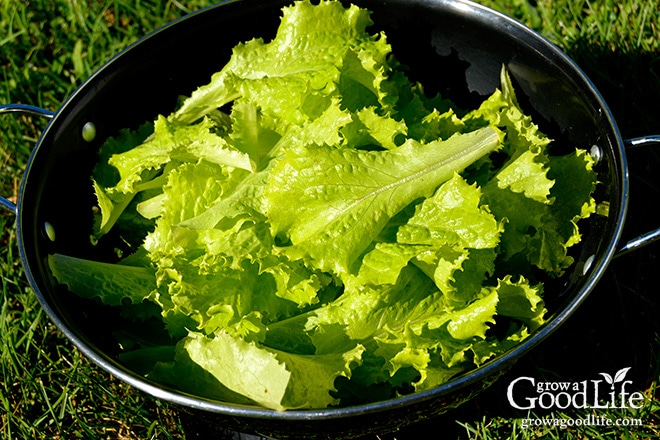
You will Eat Fresh, In-Season Vegetables
Tending to your garden and growing your own food will teach you to eat in season when flavors and nutrients are at peak. When you have a lot of harvests to use up, you tend to eat more vegetables and think of creative ways to prepare them so nothing goes to waste. Since they are harvested fresh, the natural flavors of the vegetables shine and do not need additional oils, salt, or other additives to make them taste good.
Fruits and vegetables that ripen naturally in the garden and are consumed within days of harvest have more nutrients than store-bought vegetables. Most of the vegetables that line the grocery store produce section are picked early, shipped to warehouses, distributed to the stores, and stay in storage or on the shelf for a while until you purchase them. Over time, the nutritional value of fruits and vegetables declines. Not only do freshly picked fruits and vegetables taste better, but they also have a higher nutritional value.
Gardening Provides Outdoor Exercise
During the growing season, gardening gets you out in the fresh air and sunshine regularly. There are a lot of different movements in gardening that require strength or stretching. Digging, planting, weeding, and other repetitive tasks are excellent forms of low-impact exercise.
Did you know that 45 minutes of gardening burns the same amount of calories as running 1.5 miles in 15 minutes? Regular physical activity can help you feel better and improve your well-being because it relieves stress, boosts energy and releases tension.
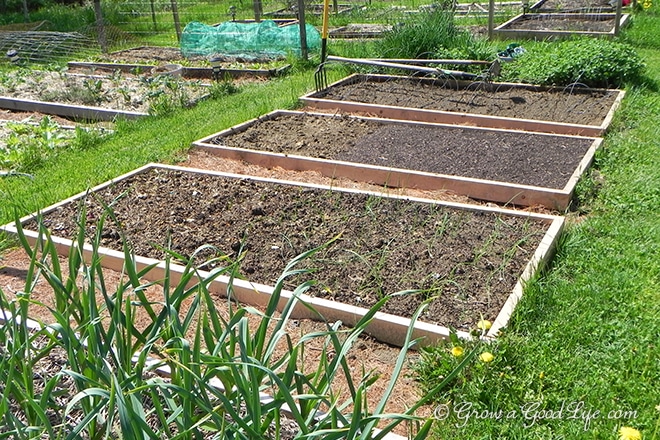
You will Waste Less Food when You Garden
Organic waste is the second highest component of landfills in the US and the largest source of methane emissions. It is estimated that 30% of the food supply is wasted, equaling more than 20 pounds of food per person per month.
None of the fruits and vegetables harvested on our property go to waste. We make every effort to eat or preserve all the food harvested from the garden. Whatever scraps or trimmings we don’t consume is either fed to our hens or added to the compost bin to be returned to the garden again as nutrients. We also give away excess harvests if we are unable to use it. When you grow your own vegetables, you understand the value more clearly.
Gardening Saves Money at the Grocery Store
Many will challenge that gardening actually saves money. When the garden bug hits, it is easy to find yourself purchasing cute pots, plant stakes, and gardening gadgets on the market. If you stick to the basics, gardening really doesn’t cost much in supplies in comparison to the amount of food it produces.
Even if you grow a small garden for fresh eating, you will save money. For example, a package of organic salad greens cost at least $5 at my local grocery store and is usually only enough for a few servings. If you grow your own from a package of good-quality organic seeds, it costs half that and produces for a longer period of time yielding about 6 pounds of salad greens.
Growing a Vegetable Garden Contributes to Your Food Security
The World Health Organization states that food security is achieved when “all people at all times have access to sufficient, safe, nutritious food to maintain a healthy and active life.”
Growing your own food garden contributes to your food security by providing direct access to food that can be harvested, prepared and fed to your family daily during the growing season. If you learn how to preserve your harvest, you will be able to stock your Pantry and feed your family even when the growing season is over.
Gardening Makes You Feel Good
Planting a seed, watching it sprout and grow to produce food for you, and your family is one of the most gratifying feelings. Sure, many of us work hard to earn a living and provide for our family, but the close association of this simple effort and direct reward is fulfilling.
I love the feeling of pride as I look over a meal I prepared with vegetables from my garden. I revel in the sensation of accomplishment as I stock our cellar with potatoes, onions, garlic, other storage crops and canned goods to get us through the winter.
How to Get Started Gardening
You don’t need a lot of land or gardening experience to benefit from growing your own food. You can start out with just a few herbs on your windowsill, a simple container of salad greens on the porch, or you could even try gardening in containers along your walkway.
Gardens do not have to be big in order to be beneficial. Choose a small area that receives at least six hours of sunlight each day and has access to water. Build a few raised beds and plant the foods you like to eat. Expand a little each year and experiment with growing different crops. You will quickly gain knowledge and learn how to take care of your garden plants, and they will reward you with great-tasting food.
- How to Build a Square Foot Garden
- 10 Steps to Starting Seedlings Indoors
- How to Build a Self Watering Container
If you live in an area that makes gardening outside impossible, or if you are physically limited, consider growing an indoor garden. There are many things you can grow indoors under the right lighting or even near a sunny window.
If you don’t have space for a garden at home, a community garden is another option. You can find one in your community through the Contact your local city or town to discover community gardening options in your area.
As you can see, the rewards for the effort of growing your own food are impressive. So what are you waiting for? Start planning your garden today!
Do you grow a vegetable garden? If so, what inspired you to grow your own food?
Good planning is key to a successful vegetable garden
Whether you are new to growing your own food or have been growing a vegetable garden for years, you will benefit from some planning each year. You will find everything you need to organize and plan your vegetable garden in my PDF eBook, Grow a Good Life Guide to Planning Your Vegetable Garden.
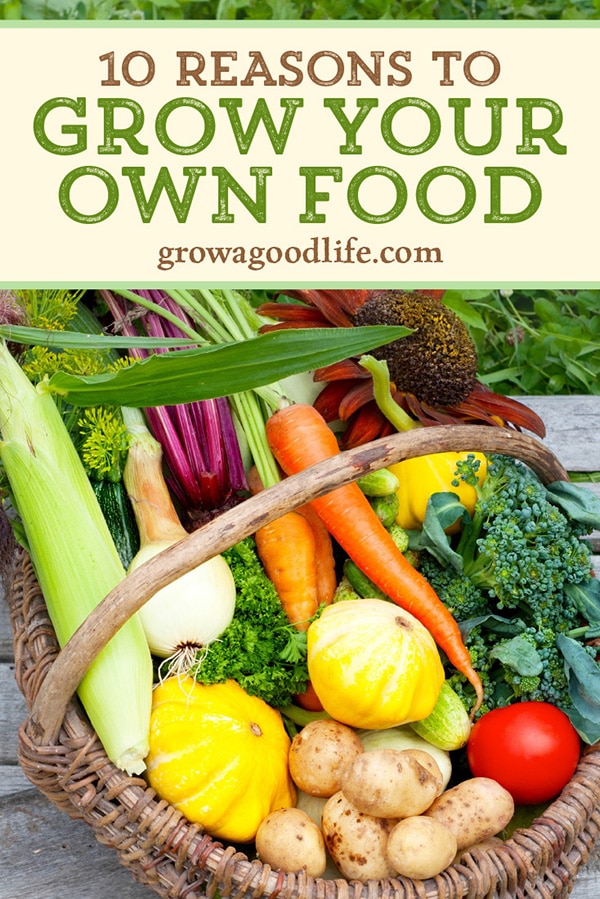

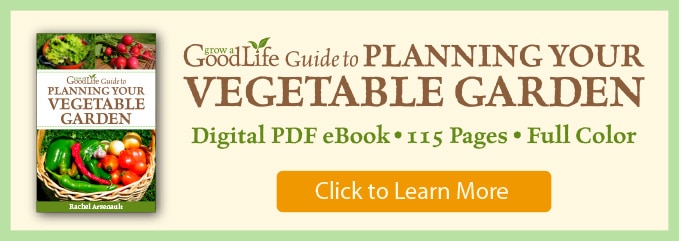
It’s wonderful to read this article. It makes me inspired to create my own vegetable garden and plant anything I want and eat any vegetables within my reach. Good job!
I loves this article, I had to research on this in order to do my assessment in school….thank u for writing a wonderful article which helped me a lot☺️☺️??
Love the site, very helpful info! We’re recently gotten into organic gardening for the better quality food, access to different varieties, and to just encourage us to eat better! I even track our progress on my own blog. Hope it can also help some people out there, maybe encourage some of the newer gardeners!
We are with you on the home garden, Just Moved to Hawaii and it is a grow your own garden mecca. We have our own tomatoes , and arugula, beet greens and green beans now. Looking forward to beets and carrots. Great Article, what fun home gardening! Sheila
Sheila, Sometimes growing your own food feels like growing money. It is very rewarding. It sound like you are on you way to a wonderful gardening year. My friend, Kris also gardens in Hawaii and blogs at Attainable Sustainable (http://www.attainable-sustainable.net/).
Growing our own organic vegetables, herbs and fruits is so important. Whether we grow food outdoors or indoors, making the effort to grow some of our food is the best way to control the quality of what we eat. Thank you for sharing the benefits of growing our own organic food.